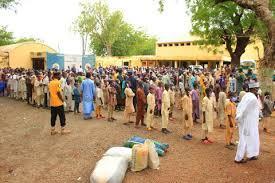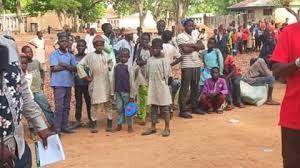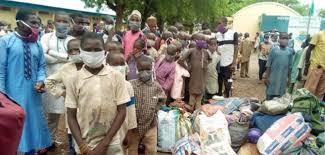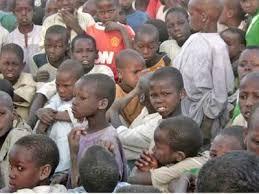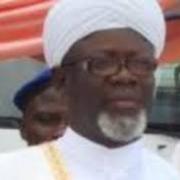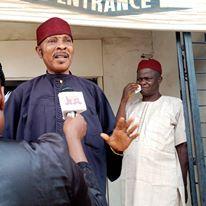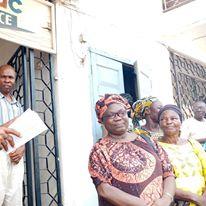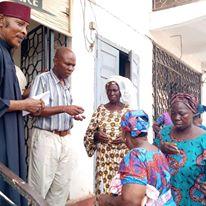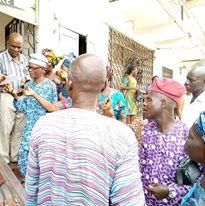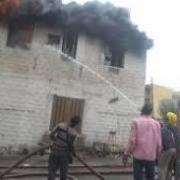Blog
-
Rot in Worship Centres Militating Against COVID 19 Eradication-Prof. Olagoke
- On 20/05/2020
- In News
 The rot in worship centers in Nigeria has been identified as one of the major factors militating against the eradication of the coronavirus pandemic.
The rot in worship centers in Nigeria has been identified as one of the major factors militating against the eradication of the coronavirus pandemic.This assertion was made in a Ed El Fitri message by the Founder, Spiritual Head and Grand Imam of Shafaudeen-in-Islam Worldwide, Prof. Sabitu Olagoke.
''Religious practice in Nigeria, Christianity and Islam inclusive has become a mere gimmick for extortion, making the houses of God to become haven for fraudsters and deposit base for looted blood money, with impunity and without control. This has relegated to the poor second, religious houses interventions in controlling the spread and evolving of solution to COVID 19 pandemic leaving government to the poor mercy of mere physical and medical precautionary measure which all must abide with'', Prof. Olagoke stated.
-
Coronavirus-Workers should not Despair-AWC
- On 30/04/2020
- In News
 Workers across the globe have been called upon not to despair as a result of the ravaging coronavirus pandemic.
Workers across the globe have been called upon not to despair as a result of the ravaging coronavirus pandemic.This call was made by the All Workers Convergence(AWC) through its National Coordinator, Comrade Andrew Emelieze.
‘’Workers allover the world are urged by the AWC not to despair in the face of the global corona virus pandemic, nothing is permanent, we shall overcome. The coronavirus pandemic is not an exception, we shall overcome’’, Comrade Emelieze concluded.
-
Daily Guide on 2020 Ramadan Exercise for Humanity
- On 29/04/2020
- In Special Report
Wednesday 29th, April 2020
The Ramadan fasting period of 29 or 30 days as guided by the curriculum, has to be followed to achieve the the culture of due process of the fear of God. This has to be taken seriously through effective teaching and learning cycle by the pedagogues or scholars of note and adherents of the Islamic religion.
The cooperation of the environment of Islam which constitutes other religious systems should be appreciated because several alcoholic shops are closed and the noise emanating from the preparation of Sahur, that is the dead of the midnight meal taken, is not only showing a good Memorandum of Understanding, but extends to the keeping of good neighborliness.
This act of tolerance and cooperation must continue after the end of the Ramadan fasting exercise. Ramadan Kareem.
Thursday, 30th April
In this period of the coronavirus pandemic , there is the need for all Muslims to respect the rules of hygiene in their daily conduct, preparation of food or Iftar, breaking of fast in the sunset and Sahur, that is taking of meal before dawn.
This is equally a period of soberness which is a precondition to have immediate response to prayer requests. Qiyamu-layl, that is voluntary Nawal-fl in the midnight during the month of Ramadan must be taken with all seriousness, to seek God’s favor on issues of personal interest and on the present challenges of mankind, which is the coronavirus pandemic, this requires divine intervention. Let us capitalize on the injunctions of the Holy Quran 2 : 186, which says that ‘’When my servant asks thee concerning Me(Allah) : I am indeed close to them, I respond to the prayer of every suppliant when he calleth on Me : let them also with a will, listen to My call and believe in Me : that they may walk in the right way.’’
Let us allow the manifestations of God the almighty Allah reflect this benevolence. Ramadan Kareem.
Friday, 1st May
The period of Ramadan affords us the opportunity to be closer to God than before by engaging ourselves in reciting the Holy Quran(Tilalatul Quran), that is studying the contents to comprehension level and never be in a hurry because the understanding of it matters most to derive its benefits.
Developing an ability to apply the content of the Holy Quran to moderate and fix our real life situation is the goal of Ramadan.
To reform and elevate us spiritually. This is the very time when we must seek beneficial knowledge that will not be touched by Satan. The Holy Quran states in 20 :114 to the Holy Prophet Mohamed, who we must follow in thoughts, words, acts and deeds with all consistency. ‘’ High above all is Allah, the King, the Truth ! Be not in haste with the Quran before its revelation to thee is completed, but say Oh ! My Lord, increase me in knowledge’’.
May the almighty Allah accept your fast as an act of Ibaadah, that is just worship. Ramadan Kareem.
Saturday, 2nd May
Let us all realize that the Ramadan fast is an act of abstinence from eating and drinking during the day. This abstinence extends to all acts that may violate the sacredness of your fast , starting from the dawn of twilight till the sun set throughout the month of Ramadan.
The purpose of this, is to thoroughly moderate our lives into that of discipline and morality and for us to be able to have the right feeling for the poor in hunger, so that the rich in their lifestyle may be able to see the need to extend their goodwill of caring and sharing towards the poor. The Holy Quran 16 : 17 admonishes the rich to do the needful in this direction. ‘’ Allah has bestowed His gift of sustenance more freely on some of you than on others ; Those more favored are not going to throw back their gifts to those whom their right hands possess to avoid them been equal to them in that respect.’’ Will they deny the favors of Allah ?
Ramadan has really come to teach us on how to live a fulfilled life through meeting the needs of others when we have the means. Ramadan Kareem.
Sunday, 3rd May
The Holy Prophet has a prophetic prayer against epidemic, ‘’Oh Lord I seek refuge in you from leprosy, insanity, elephantiasis and from evil diseases.’’ The likes of this prayer, however, can only be answered in this period of moral decay, if we are able to determine, to refrain from sins and criminality as well as allowing God the almighty Allah to purify our souls.
Fortunately, this year’s Ramadan fasting period coincides with the challenges of the coronavirus pandemic, which can only be defeated through divine intervention that requires our sincerity of purpose in our worship. Much as we cannot attempt Tafsirul Quran, that is in depth analysis of the Quran, the opportunity through the media, gives us the chance to listen to sermon as a preferred alternative. The following references from the scripture are tests to this : Psalm 24 :1–10, Quran 10 :57 and Quran 17 : 81–82.
Let us be scripture compliant to be socio-spiritually fortified. Ramadan Kareem.
Prof. Sabitu Olagoke
Founder, Spiritual Head and Grand Imam Shafaudeen-in-Islam Worldwide,Wakajaiye, Ibadan, Nigeria
-
Coronavirus-Govt should Enforce the Use of Face masks-Eze(Dr.)Anozie
- On 25/04/2020
- In News
 Federal and state Governments in Nigeria have been advised to enforce the use of face masks as a step towards curtailing the spread of the coronavirus pandemic.
Federal and state Governments in Nigeria have been advised to enforce the use of face masks as a step towards curtailing the spread of the coronavirus pandemic.This advise was given by the Ezendigbo of Ibadan and Oyo state, Eze(Dr.) Alex Anozie.
‘’My advice to the Federal and state Governments towards our battle against Coronavirus is that Government should make the use of face masks compulsory and automatic throughout the nation for the next one month. Also, Government should relax the lock down a bit to enable Nigerians fetch their daily bread, but they must put on face masks. Everybody, Okada riders, taxi drivers, Journalists and everybody who is coming out from his or her home to the public must put on face mask for the next one month. In addition all barbing and hair dressing salons must remain closed for now. Anybody seen on the streets without face mask should be arrested, prosecuted and made to pay a fine’’.
‘’However, banks and all health institutions must remain functional, and the workers concerned must put on face masks. Social distancing should continue including hand washing and sanitizing the hands. With all these in place, I am sure that we shall win the war against coronavirus. In addition, Government should hasten the process of providing palliatives for the people. After one month, Government should sincerely, review the present situation based on reliable information across the country’’, Eze(Dr.) Anozie stated.
-
Daily Guide on 2020 Ramadan Exercise for Humanity
- On 24/04/2020
- In Special Report
The Ramadan exercise is an annual activity of socio-spritual importance to mankind, but purposely for the adherents of Islam to keep the body system fit and make its environment safe and secured in order that human interpersonal relationship in every sphere of human endeavor is made cordial.
Lessons are expected to be learnt for 29 or 30 days in the 9th month of the Lunar calendar. Let us be reminded of the fact that it is a grace and privilege from God for humankind that we are alive to observe it for this reason it must be taken with all seriousness. Ramadan Kareem.
Saturday 25th April
Let us all avoid engaging in unwarranted controversies over the fat that it is difficult to start for observations at the same time. What should preoccupy our minds is to appreciate the efforts of those who go through calculations to determine the beginning of Ramadan using the end of Shaaban for the first Tarawih, so that the Ramadan will start on the first day of the 30 day first.
Let us equally appreciate those who take the patience to observe it through sighting the moon to start the Tarawih for their own length of Ramadan fats to be 29 days in some cases.
Both of them are expected to go for Eid as thanksgiving period to Allah on the first day of Shawwal which is the 10th month of the Lunar calendar. The fact remains that Ramadan fast must not extend to 31 days or be shortened to 28 days . The basic cause of the differences of opinions is the spherical structure of the earth that makes the sighting of the moon to be difficult to be observed in our different locations at the same time.
The second point is that of the weather condition which may be cloudy.
Above all, only those who fast during this month to achieve the set objective of the fear of God matters most to the Almighty Allah. Ramadan Kareem.
Sunday, April 26th
Let us appreciate God the almighty Allah for the present condition of mankind in the COVID 19 challenges to coincide with the season of need for repentance from sins and crimes.
This is because naturally fasting exercises with prayer has always been for mankind, a prescribed solution to ward off evil.
The Muslims, in this season of soberness must work hard through the Ramadan fasting exercise to achieve preventing the further spread of the Corona-virus, finding permanent vaccines for its cure by seeking for God’s guidance and divine intervention.
This can only be achieved if we are mindful of the fact that our frivolities ans waywardness including infidelity must have brought about the present human mistakes of the scientists that manufactured the biological culture leading to the present travail of man been brought about by the Coronavirus pandemic..
No better opportunities can be given by God than that of the Ramadan fast, this period. Let us be more serious on it than before. Ramadan Kareem.
Monday, 27th April
Ramadan has a characteristics curriculum which adherents of Islam must recognize and follow to be able to have a resounding success in the 29 to 30 days spiritual training sessions which must reform us to be able to transform our environment for better. For example, Tarawaih, a voluntary Nawafl during the night of Ramadan, although we cannot observe it congregation-ally, this time around because of the closure of Mosques including those in Saudi Arabia which is the source and center of Islamic spread to all the nooks and crannies of the world.
Muslim faithful should endeavor to seek for divine intervention on the Coronavirus pandemic. Suffice it now to say that no condition can destroy a structure erected by God and the design of God over matters can never be rubbished in the force of all conditions.
This as observed needs to strengthen your faith in getting closer to God. May God save us from all calamities. Ramadan Kareem.
Tuesday, 28th April
Still on the structure of the curriculum for Ramadan fasting exercise as must be observed accordingly for 29 or 39 days, it is compulsory for Muslim adherents to painstakingly observe the exercise in a way that will make him or her achieve the culture of the fear of God or using due process in executing programs.
For example Sahaur has a divine commutation and it goes beyond mere meal taking during Ramadan fasting before dawn . It is as significant as Iftar period, that is breaking of fast period during the month of Ramadan. Remember that most people are poor to be able to fund the cost of material demand to satisfy the conditions of Sahaur and Iftar. Of equal importance is the opportunity Oiyamu-layl that is voluntary Nawafl in the midnight during the month of Ramadan. This opportunity demands that we pass the test of body preservation for sins and crimes as well as soul purification from evil thoughts for us to be able to commune with God to have a resounding success through visible prayer efficacy-James 5 : 16, Quran 13 : 14. Ramadan Kareem.
Prof. Sabitu Olagoke
Founder, Spiritual Head and Grand Imam Shafaudeen-in-Islam Worldwide,Wakajaiye, Ibadan, Nigeria
-
MD Conac Opticals(Nig) Limited Gives out Financial Palliatives to Residents
- On 17/04/2020
- In Pictures
On Wednesday, 15 April,2020, the Managing Director of Conac Opticals(Nig) Limited, Eze(Dr.) Anozie distributed financial palliatives to residents of Ososami road, Ibadan, Oyo state Nigeria.
According to Eze(Dr.)Anozie this gesture was borne out of the need to cushion the negative effects of the partial lock down in the state, as a result of the coronavirus pansdemic, on the residents.
''I sat down and thought of it, how are people coping in these critical times, so God gave me the directive to gather the downtrodden and give them the financial palliatives. In the light of this, I appeal to every business venture in the state to replicate this gesture in their various locations in different parts of the state'', Eze(Dr.)Anozie submitted.
-
Lock down- Disconnect Sources of Power Supply in Offices and Shops-Oyo Fire Service
- On 17/04/2020
- In News
Nigerians have been advised to ensure that all sources of electricity supply to their offices, shops and business premises are disconnected before proceeding on the indefinite break occasioned by the coronavirus pandemic.
This advice was given by the Deputy Director, Oyo state Fire Service, Mr. Moshood Adewuyi.
‘’In this time of lock down those who are not in their offices, shops and business premises should isolate the power supply. Also they should discourage the handling of highly inflammable content in their offices, shops and business premises’’.
‘’I also want to advise that every home, office and shop should have a potable fire extinguisher to curtail any fire out break. They should attach great importance to 9 Kg/Co2 fire extinguishers. In addition, I appeal to members of the public not to hesitate to call the fire service in the event of any fire outbreak, so as to minimize the destruction of valuables’’, Mr. Adwwuyi stated.

